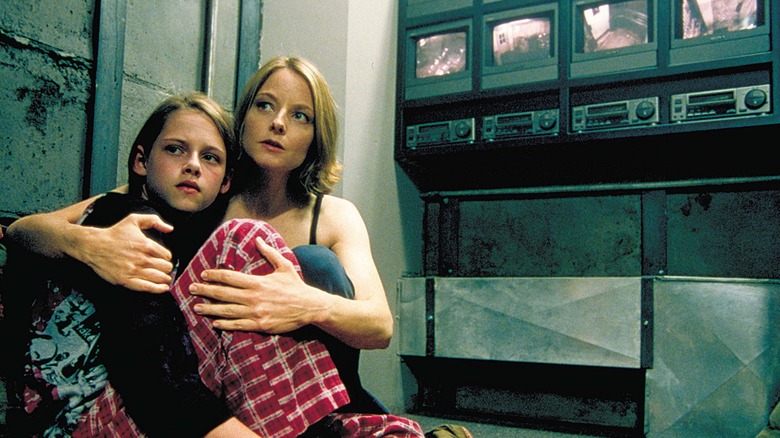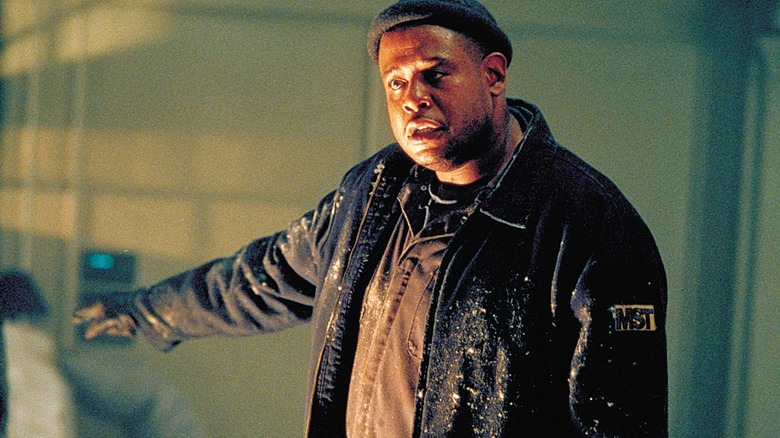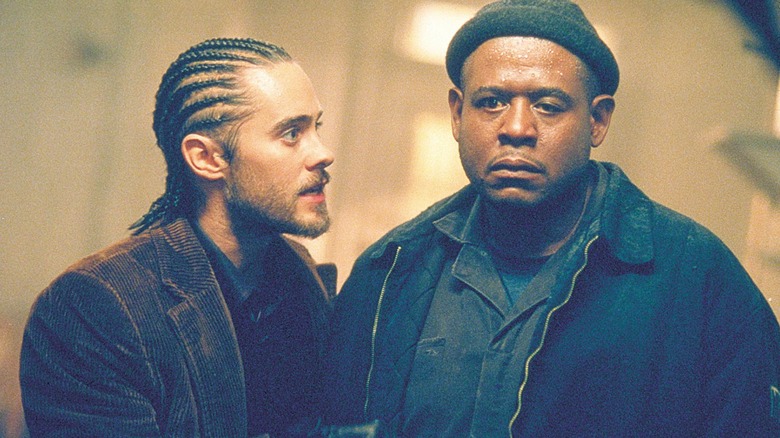David Fincher's Overpreparation For Panic Room Was Too Much For Its Stars
David Fincher's 2002 film "Panic Room," starring Jodie Foster, Forest Whitaker, Kristen Stewart, and Jared Leto, is one of the more stylish, taut thrillers of its decade. The cinematography by Conrad W. Hall and Darius Khondji captured light as it hung, sterile in the air, the sweeping, balletic camera movements giving the audience the experience of floating into cramped, enclosed spaces. "Panic Room" was Fincher's first film after 1999's "Fight Club," a maligned-at-the-time, MTV-inflected middle finger to '90s consumer culture that would only eventually find purchase in the pop consciousness after years of cult re-watching. "Panic Room," was a step back from something as high-concept as "Fight Club," delivering a straightforward and efficient locked-room crime flick (the script is by David Koepp) about a home invasion.
Fincher proved that he is just as capable with uncomplicated thrillers as he is with high-profile style essays, and "Panic Room" was a big success, holding a 76% approval rating on Rotten Tomatoes, ultimately earning nearly $100 million domestically.
There was, however, a conflict between Fincher's way of making movies, and the way actors like to work. Not a fight, mind you, but Fincher is such a powerful stylist, it took him years to admit that he was more in love with the camera than he was with his actors. The cast was focused on the panic, while Fincher preferred the room. In a 2021 interview in Variety, Fincher reunited with actor Ben Affleck to reflect on making "Gone Girl" together, and Affleck served as interviewer with Fincher as the subject. In that interview, Fincher — with Affleck's goading — finally said out loud that, with "Panic Room," he wasn't entirely fair to his cast.
'It didn't work for one of the most interesting reasons'
In the Variety interview, Affleck says that he watched "Panic Room" to prepare for his role in "Gone Girl" to get a good feel for how Fincher operates. Affleck was very impressed with "Panic Room," calling it an "astonishing document." Fincher was demure, however, realizing how unwell it functioned:
"[I]t did not work, it did not work. And it didn't work for one of the most interesting reasons, which is that it obviates a sense of authorship by the thespians. And you need that. I believe that every voice is there to be nurtured so that people ... go, 'I think you're missing something here.' I want people to feel like they can stop the train to say that. You don't get to do it three times and be wrong all three times. That's a problem."
Fincher appears to be concerned that he wasn't allowing his actors to "stop the train," as it were, to be heard. Films are, after all, a massively collaborative process, and actors can often bring insight into characters that the filmmakers hadn't previously considered. Actors are the ones seen on screen, they are the ones speaking dialogue. They are, from the audience's perspective, the only authors we see. Taking initiative from an actor can stymie their talents and wear them out. Fincher admits something like that happened with Whitaker on "Panic Room." He said:
"A movie set, it's an organism, there has to be a certain amount of resistance to just motion, you have to keep the amoeba contained. What I found on 'Panic Room' was the last person in the world that I ever wanted to kind of repel from the process was Forest Whitaker. Because he has so much to give in the moment, he's so great at that. And four or five weeks into the second time we started that movie — because we had to reshoot — he just, kind of, he just felt beat."
Learning his lesson
Whitaker, in a 2002 interview with Blackfilm, stressed his view of his character, and how important character was, stating how "Panic Room" was different from the other sets he had worked on. He also pointed out that it was an incredibly long shoot, and that he wasn't always interacting with his co-stars:
"The guys on the set, Dwight [Yoakam], Jared, and me, would work for a day, and then the next day Jodie would work. We rarely worked together, so it was all about getting to know some of the guys. With the way scheduling was, she's not in the small frame as all of us. They never did it that way. The thing about the film was you did become closer with some people in ways because it took so long. This is the longest shoot I have ever had. It was about 145 shooting days. We also had rehearsals before that. I think it so long because of the shots taken. It was the most planned movie I've been involved with."
At some point, Fincher must have changed his tune, however, because Affleck said in the Variety interview that Fincher did allow for him to make suggestions and contribute ideas: "A lot of actors feel like they want to be able to create and explore and come up with stuff and contribute," Affleck said, "and you are very open and welcome to that."
Fincher came from the world of music videos before directing feature films — he directed Madonna's "Express Yourself," and "Vogue," Billy Idol's "Cradle of Love," and Nine Inch Nails' "Only," among many others — making for a career based on serving a single artist/band and their music. Working on character arcs is a different discipline, and while Fincher's films were coherent ("Alien 3" perhaps notwithstanding), it took seeing Whitaker upset to get the message.
Fincher's next film, "The Killer," set to be released through Netflix, has wrapped filming.


